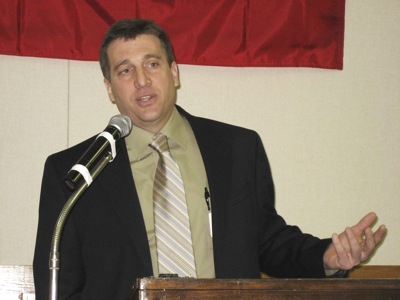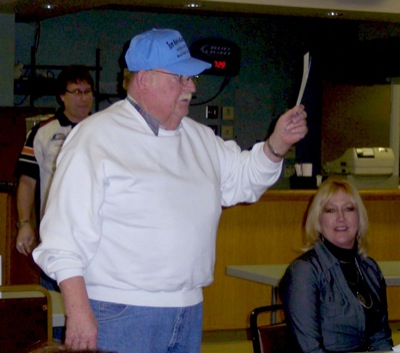Friday, January 28th, 2011
State unveils actions for lake
Dredging, carp removal, money for treatment trains among actions announced by governor, state heads
By Nancy Allen
GRAND LAKE - Gov. John Kasich and three state directors on Thursday announced initiatives to help save Grand Lake, including a second alum test to see if the chemical can be used to starve the lake's toxic blue-green algae.
"We can't guarantee success," Kasich said. "All we can do is take our best shot at this through these series of mitigations."
Other actions announced during a press conference include increasing dredging by starting the season earlier and ending it later; replacing an old dredge with a new one; removing carp, which stir up and release phosphorous from the lake sediment; funding two more treatment train systems that capture phosphorous in lake tributaries; and appointing a state agriculture official to coordinate work between the state and local officials.
The next alum test will use granular alum and peroxide, said Ohio EPA Director Scott Nally. The first alum test last summer used only liquid alum and produced mixed results. Those analyzing the results recommended a second one be done this spring during cooler temperatures and pretreat the test areas with peroxide to help the alum work better.
"As soon as the weather breaks, we're going to go forward with that," Nally said.
If the second alum study produces good results, the state could decide to do a larger scale alum treatment within 30 days of the application, he said. The size of a large treatment would be based on available dollars, he added.
There will be two test sites - one in a channel and a second in the lake. ODNR estimates the test will cost $90,000. It will be paid for with funds leftover from last summer's alum test and new Ohio EPA grant money, said ODNR spokeswoman Heidi Hetzel-Evans.
David Mustine, director of the Ohio Department of Natural Resources, said the state plans to dredge 200,000 cubic yards of sediment from "strategic" locations that have not yet been chosen. The muck will be placed in existing spoil sites, and the state will look for others to accommodate the extra material, he said.
Last year, just 68,000 cubic yards of sediment was removed from the lake because the season was shortened due to the algae toxins and water warnings. In 2009, 149,000 cubic yards was removed, Mustine said.
Kasich said helping Grand Lake will take teamwork, calling state agriculture director Jim Zehringer, Nally and Mustine the "three amigos." He lauded the work of the local Lake Restoration Commission (LRC), which has raised about $600,000 to help the lake.
When asked why his administration has made the lake a top priority when the state has many issues, including a $8 billion deficit, Kasich said, "When one part of Ohio hurts, all of Ohio hurts."
"We don't want to lose a great resource like this," he said of Ohio's largest inland lake at 13,500 acres. "If it was only one place, it would be different, but there are other bodies of water experiencing this problem."
Zehringer said his staff is looking into ways the department of agriculture can assist and possibly fund the two treatment train systems. The county already received a grant and used money raised by the LRC to pay for the first treatment train. The system includes a collector to capture lake sediment, a giant aerator to oxygenate the water, a chemical flocculate to make sediment particles stick together to be more easily caught in the collector, stream restoration, constructed wetlands, floating wetland plants in the stream and a cove.
The initiatives announced Thursday are the result of meetings held between the state directors and LRC members. The LRC formed a year ago to find solutions to the lake's water quality. Its members have met twice with the directors and pitched its lake action plan to them.
LRC member Jared Ebbing, who also is the county economic development director, said he is impressed with the speed with which the new administration is addressing the lake's algae issue. He knows there is still no guarantee of success.
"We all feel like we're on the boat together rowing in the same direction," Ebbing said. "The items in our action plan are finally going to be acted on."





